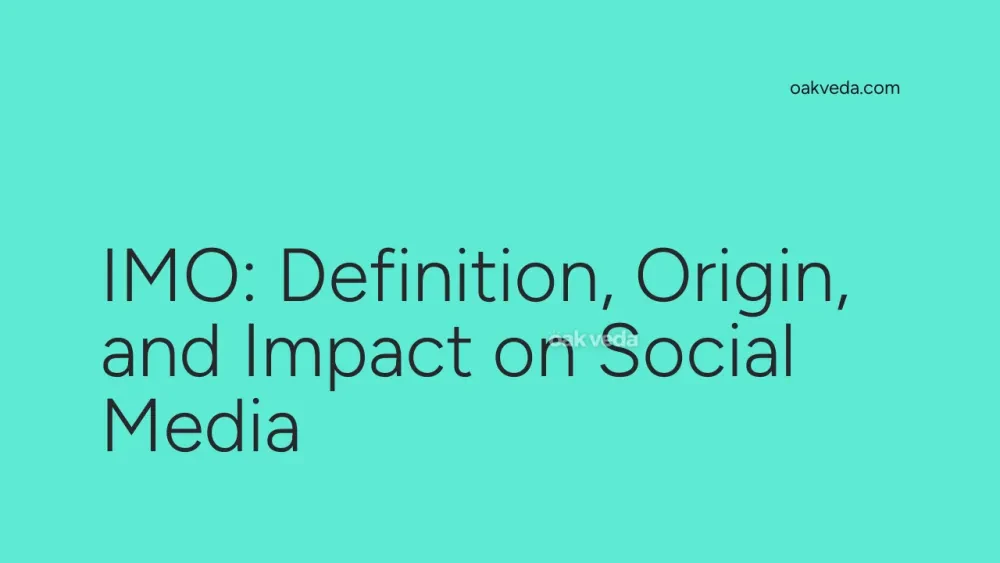
What is IMO?
IMO is an acronym that stands for "In My Opinion." It's a widely used shorthand in digital communication, particularly on social media platforms, messaging apps, and online forums. When someone uses IMO in their message or post, they're signaling that the statement that follows (or precedes) is their personal viewpoint rather than an objective fact.
Origin and Development of IMO
The exact origin of IMO is difficult to pinpoint, but it likely emerged in the early days of internet chat rooms and forums in the 1990s. As online communication evolved and became more concise, acronyms like IMO gained popularity for their ability to convey meaning quickly and efficiently.
Over time, IMO has become a staple in internet language, alongside other popular acronyms like LOL (laugh out loud) and FWIW (for what it's worth). Its widespread use has led to variations such as IMHO (in my humble opinion) and IMO (in my observation).
How IMO Works
IMO serves several important functions in online communication:
- Disclaimer: It acts as a disclaimer, indicating that the speaker is expressing a subjective view.
- Tone softener: IMO can soften the tone of a statement, making it less confrontational.
- Conversation starter: Using IMO can invite others to share their opinions on a topic.
- Clarity: It helps distinguish between facts and personal beliefs in written communication.
For example, someone might write: "IMO, the new iPhone design is a step backward." This clearly indicates that the statement is a personal judgment rather than a universally accepted fact.
Types or Variations of IMO
While IMO is the most common form, several variations exist:
- IMHO: "In My Humble Opinion" or "In My Honest Opinion"
- IMNSHO: "In My Not So Humble Opinion"
- IME: "In My Experience"
- IMPO: "In My Personal Opinion"
Each variation adds a slightly different nuance to the basic meaning of IMO.
Popular Examples of IMO
IMO is used across various social media platforms and in different contexts:
- Twitter: "IMO, climate change is the biggest threat we face as a species."
- Facebook: "The new restaurant downtown is overrated, IMO."
- Reddit: "IMO, the book was better than the movie adaptation."
- Instagram: "This filter makes everything look better, IMO."
Impact of IMO on Social Media Culture
The widespread use of IMO has significantly influenced social media culture:
- Encouraging opinion sharing: IMO makes it easier for users to share their thoughts without fear of backlash.
- Promoting diversity of thought: By clearly labeling opinions, IMO helps showcase the variety of perspectives on any given topic.
- Facilitating discussions: IMO often serves as an invitation for others to share their views, fostering engagement.
- Reducing conflicts: By explicitly framing statements as opinions, IMO can help prevent misunderstandings and reduce online arguments.
Controversies or Debates Surrounding IMO
While IMO is generally seen as a useful tool in online communication, it's not without its critics:
- Some argue that overuse of IMO can make a person seem indecisive or lacking in confidence.
- Others contend that IMO is often used disingenuously to soften controversial or offensive statements.
- There's debate about whether using IMO absolves the speaker of responsibility for potentially harmful opinions.
How Brands and Influencers Use IMO
Brands and influencers have incorporated IMO into their social media strategies:
- Authenticity: Using IMO can make brand communications feel more personal and authentic.
- Engagement: Brands use IMO to invite customer opinions and feedback.
- Product reviews: Influencers often use IMO when giving their thoughts on products or services.
- Trend commentary: IMO is frequently used when commenting on industry trends or news.
Future Trends Related to IMO
As social media continues to evolve, we can expect to see:
- Integration into AI: Chatbots and AI assistants may use IMO to mimic more natural, opinion-based responses.
- Visual representations: Emoji or custom icons representing IMO may become more prevalent.
- Platform-specific variations: Different social media platforms might develop their own unique versions of IMO.
- Increased importance: As misinformation concerns grow, clearly labeling opinions may become even more crucial.
FAQs about IMO
-
Is IMO only used on social media? No, IMO is used in various forms of digital communication, including emails, text messages, and online forums.
-
Does using IMO protect me from criticism? While IMO indicates that you're expressing an opinion, it doesn't shield you from potential criticism or debate.
-
Is it professional to use IMO in business communications? It depends on the context and company culture. In formal business writing, it's often better to use the full phrase "in my opinion" or rephrase the statement.
-
Can IMO be used sarcastically? Yes, like many aspects of online communication, IMO can be used sarcastically or ironically, depending on the context.
-
Is there a difference between IMO and IMHO? While often used interchangeably, IMHO can be seen as slightly more modest or polite than IMO.
In conclusion, IMO has become an integral part of online communication, particularly on social media. Its ability to clearly delineate personal opinions from facts makes it a valuable tool for fostering open, respectful dialogue in the digital age. As online interactions continue to shape our social landscape, understanding and effectively using acronyms like IMO will remain crucial for navigating the complexities of digital communication.
You may be interested in:
- Featured Banner: Definition, Origin, and Impact on Link in Bio
- Stitch: Definition, Origin, and Impact on TikTok
- Watch Time: Definition, Origin, and Impact on YouTube Success
- ROI in Marketing: Definition, Origin, and Impact
- CPC (Cost-Per-Click): Definition, Origin, and Impact
- Koji: Definition, Origin, and Impact on Social Media

